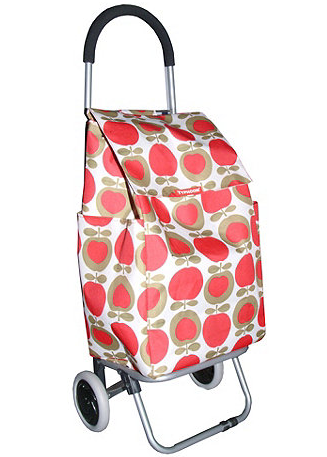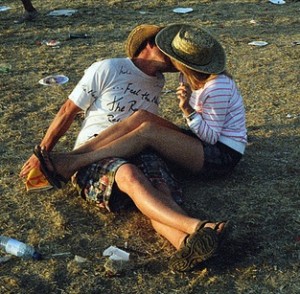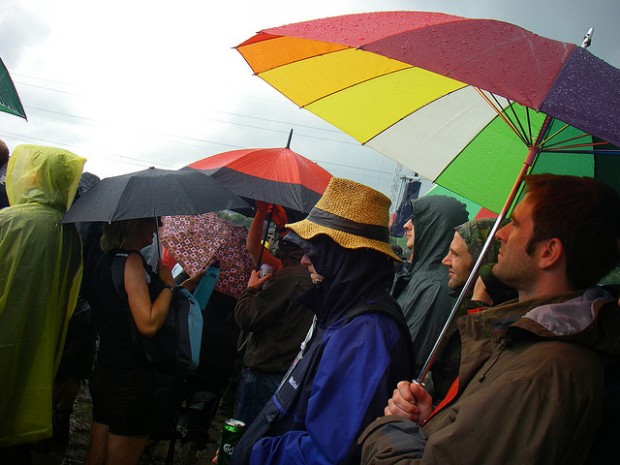
Photo by Hanny Naibaho on Unsplash
YES you can go party at Glasto, V, Bestival & co! Just check out our Survival Guide first and make your dreams of festival bliss a reality
Festivals are a glorious feature of the Great British Summer – sunburn, rain, mud and music. What could be better?
But surviving festivals can be a difficult proposition at the best of times, and with arthritis it can be, well, quite a lot more ouchy. It doesn’t have to be that way, though. We’ve talked to the experts and put together this definitive Survival Guide, to get you through the festival seasons with more laughs and less agony. Don’t leave home without it!
Camping
Camping is something that tends to divide people. You either love it, or you don’t see the point of squatting in mud and misery when you could be tucked up in a warm, cosy, clean bed instead.
If you fall into the latter category, you have a ready-made excuse. Simply play your ‘health’ card, check in at the nearest B&B and revel in luxury while your friends all get trench foot.
If, however, you actually like camping, there are a number of ways you can make it less painful.
Bedding – It can be difficult to get up off the floor with some types of arthritis – especially first thing in the morning. Fold-up beds make it a lot easier for you to get up and go. Outwell Posados are supposed to be very good but there are lots out there.
You can also put a mattress topper on top, or even an air mattress on the top of a camp bed which can help with the height as well. Take some extra pillows with you for comfort. There are plenty of light-weight thermal sleeping bags which aren’t too heavy to lug around. There’s a good guide to sleeping bags here.
Tents – If the weather’s bad, and let’s face it, it probably will be, you may spend more time than is enjoyable in your tent. This will be even less enjoyable if your tent is the size of a postage stamp. Make sure you get one of those big ones that you can stand up in and stretch your legs. Camping doesn’t have to be hugely uncomfortable… Some festivals also provide a service where you can pay to have a tent put up ready for you, which is particularly handy if you’re not the best at DIY.
Caravans – This is the half-way house between slumming it and lording it up. And apparently caravans are cool now. Who knew? If you don’t have your own, there are a number of caravan and motorhome hire companies offering a rental service. These are a bit more pricey than camping though – you’ll pay upwards of £250 for a two-berth caravan for a week. If you really want to do the festival without the fuss, there are hire companies (such as Blackmore Vale Leisure) who will hire you a caravan, take it to the festival of your choice, set it up for you, and give you a quick lesson in how to work all the mod cons.
Logistics – Plan ahead and think about how far you’re going to have to carry your kit from the car to the campsite. Small festivals are obviously easier but at places like Glastonbury you may have to wade through several fields before you can pitch your tent. Will you need help to carry equipment? Do you have a Blue Badge which will entitle you to a disabled parking space with easier access?
Most festivals have websites with information about disabled access, and if you’re in any doubt about your needs and whether they will be accommodated, it’s a good idea to email the organisers first.
If you don’t qualify for a disabled parking space and you think trekking across fields will be an issue, another option is to share a minibus taxi to get you, your friends and all your gear dropped off and picked up as close as possible to the campsite. Plan ahead to make sure you get a set fare and a good deal.
If you’ve got a lot of stuff to transport, there’s good news – granny shopping trollies are really fashionable. No, really, they are. You can get some super funky ones these days. Depending on the terrain, plastic lightweight sledges might be useful to pull along as well.
Don’t forget your comfort while you’re there though – pop-up fisherman’s chairs are cheap and can make all the difference in that you’re not squatting on a cold damp floor when you’re sitting around the camp fire. And there’s somewhere to put your drinks can. Don’t go mad on the expensive ones though as they do tend to go walkabout.
Dr Ronan Kavanagh, a consultant rheumatologist from Galway, says: “Plan your trip and get there in plenty of time. It may be a long walk from the car parks to the entrance so check in advance if there’s a drop off point so you can get as close to the entrance as possible. If you have problems with walking, make sure you pitch your tent close to the toilets (but not too close!)
“Carrying your bags / tents / sleeping bags long distances can be a struggle for people without a disability. See if it’s practical to bring a trolley / get a friend to help.”
Medication
Again, think of the Scouts’ motto – Be Prepared! “Bring a list of medications or a medical alert card especially if your are taking steroid medications,” says Dr Kavanagh.
There are likely to be restrictions on whether you can bring injectables with you – so if this can be avoided safely then it’s for the best.
“If you are on biologic medications and you are due an injection at the time of the festival ask your rheumatologist / specialist nurse if its ok to delay your dose,” says Dr Kavanagh.
“Make sure you’ve got an adequate supply of pain killers or anti-inflammatories (as prescribed) in case you get a flare-up.”
 If you are taking medication, then make sure you have it somewhere safe and keep it with you in a zipped pocket or a bum-bag so it doesn’t get pinched by someone who’s looking for a free high. We love this metallic pineapple bumbag by ASOS, £15. ASOS also sells bumbags for chaps, such as this more gender-neutral Eastpak bumbag.
If you are taking medication, then make sure you have it somewhere safe and keep it with you in a zipped pocket or a bum-bag so it doesn’t get pinched by someone who’s looking for a free high. We love this metallic pineapple bumbag by ASOS, £15. ASOS also sells bumbags for chaps, such as this more gender-neutral Eastpak bumbag.
Booze and drugs
The classic advice – don’t go mad. “Take it easy on the booze – especially if you’re taking medications like Methotrexate,” says Dr Kavanagh.
It’s also never a good idea to try something new at a festival – especially if it’s some dodgy tablet with a funny picture on it that was slipped to you by a bloke in the dance tent who looks like Bez. It could be absolutely anything, from paracetamol to ketamine.
Know your limits, and don’t attempt to push them any further when you’re a million miles away from home, somewhere in a field in Hampshire.
Pacing yourself
Don’t think that you’re a failure if you need to go and have a little sit down every now and then. The festival will be full of people who are crashing out all over the place and they don’t all have arthritis. Be kind to yourself. “Take it easy!” says Dr Kavanagh. “Try and get some sleep, remain hydrated and give your body a chance to recover from the exertions of the festival.”
Eating properly
We all know that eating a healthy, balanced diet is good for us. But that’s not always practical at festivals. It depends on the size and type of event – at the bigger festivals, you can find pretty much anything from kale soup to deep-fried pizza. At the smaller events, it’s hot dogs or hot dogs. But a couple of days on the hot dog diet won’t kill you. Just make sure that you eat SOMETHING reasonably substantial, especially if you’re drinking and dancing, otherwise you’ll keel over.
Safe sex
Let’s face it, there’s nothing more romantic than hooking up with someone at a festival, under the moonlight, with the music pounding and your heart racing… even if you are only metres from the chemical toilets and your mate is being sick in his shoes next to you. But don’t let the moment carry you away – this is another occasion when you need to think ahead.
“If you think there’s any chance that you will be sexually active at the festival make sure you’re on adequate contraception – this is especially relevant for people taking medications like Methotrexate,” says Dr Kavanagh.
But don’t forget that long-term contraception like the Pill won’t protect against sexually transmitted diseases, so if you want to avoid bringing home an embarrassing souvenir, make sure you’ve got condoms handy too.
The weather
The Great British Weather can be, well, unpredictable and not always great. That means you need to prepare for any eventuality – whether that’s knee-deep mud or glorious sunshine. It’s particularly important to protect yourself from the sun.
Dr Kavanagh says: “Bring plenty of sun protection – high factor SPF, caps and clothing to cover extremities. Certain medications can cause ‘photosensitivity’.”
It’s important for all of us to be conscious of the dangers of skin cancer, and with some conditions and treatments the risk may be slightly higher. Also, nobody likes getting sun-burnt and spending the rest of the festival like a sore lobster. So cover up, wear sunscreen and stick to the shade in the middle of the day if it’s really hot.
But even if it’s roasting during the day, it can still get cold at night and you need to be prepared for that too. It can be difficult to lug around huge duvets and sleeping bags – one alternative is to get hold of some Under Armour or Skins sports gear, which acts as a base layer and keeps you warm.
You can also look at getting light-weight thermal sleeping bags which actually warm you when it’s cold and cool you when it’s hot – very useful when the sun comes up in the morning and the temperature shoots up. You also need to insulate yourself from the floor, which is cold. Roll mats, good airbeds, and campbeds with legs will all do a good job here.
Then there’s the rain. If there’s any chance it’s going to rain while you’re away, you must be prepared. It can only take one short downpour to leave you miserable for the rest of the weekend if you haven’t planned in advance.
Plastic bags are a must – small ones to hold your mobile phone, your medication, and any other valuables. Big plastic bags can protect your bedding, clothes, and rucksacks. Raincoats are obviously essential – and you could also invest in some of those funky waterproof trousers. If it’s going to be really muddy, waterproof shoes or wellies would be handy. Tarpaulins and rain guards can protect your tent, and it’s also best to avoid camping at the bottom of a hill where the water will run in through your front door.
Medical facilities
At large festivals there will be medical facilities readily available if you need them. Find out where they are! Even if you don’t need them, it will give you peace of mind. Festival Medical Services (FMS) is a charitable trust that provides doctors, nurses, paramedics, first responders and other trained medical & administrative personnel to music festivals throughout the UK, including the Glastonbury and Reading festivals.
The Red Cross is also present at a range of events across the country.
At the V Festival in Essex, St John Ambulance and the East of England Ambulance Service NHS Trust jointly provide medical assistance. They advise festival goers not to call 999 but to look out for the posters around the site with on-site emergency numbers for medical help. The St John Ambulance service is also around at many smaller festivals. There will be someone there to help you out at any event, large or small – but you need to make sure you can find that help, or find someone who can get you to the right place.
Disabled facilities
Check out your status and check the festival’s policies on disability. Some venues have a disabled hotline where you can apply for tickets separately from the main ticket sale – others simply let you take your chances with the rest. Then, if you qualify, you can apply for camping or caravanning on the disabled site.
At Glastonbury, if you want to use any of the disabled facilities onsite, you must be pre-registered. You can get a disabled access pack by emailing disabledenquiries@glastonburyfestivals.co.uk which explains what facilities there are and how to register.
You may also be able to bring along a personal assistant who won’t need a ticket – depending on need. You normally have to be in receipt of disability benefits in order to qualify. For those who need them, there are also mobility scooters and disabled platforms where you can sit above the crowd and see the stage. More information about disability provision at Glastonbury
At the V Festival, there are dedicated disabled access teams. You can buy disabled access tickets and disabled camping tickets, and they also provide free personal assistant or companion tickets if needed. For more information about disabled facilities at the V Festival, go to http://www.vfestival.com/disabled-access or email disabledcustomer@vfestival.com.
Real life stories
Carly Dalkowski, 24, from Cheshire
Carly says: “My fiancé and I often go to festivals, and one time after being on my feet all day, I was unable to walk any longer. I stayed in the tent on my own while my fiancé and friends continued enjoying the festival without me. I had a quiet cry to myself, but then realized that there are other people who are a lot worse off than me and wouldn’t even have been able to make it to the festival.”
Carly is now planning to go to a festival this year, for the first time in two years. “My diagnosis was changed from psoriatic arthritis to rheumatoid recently, which I’m really struggling with, so I’m having to do things a little differently this time,” she says.
Rosemary Buttery, 25, from London
Rosemary was helped by the Red Cross at Glastonbury after getting into difficulties. She says: “I’ve got rheumatoid arthritis in all my joints and I was queuing for the bus at Glastonbury and got a bit tired, a bit worn down.” She says the Red Cross helped to get her on a train so she could get home safely. “I think Red Cross volunteers are amazing. They’re fantastic people and everyone should support them,” she says.





